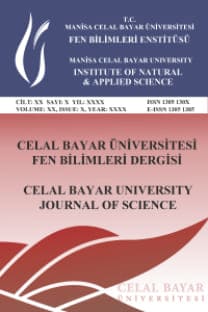Jelatin Doku İskelesinin Mekanik Özellikleri Üzerine Gözenek Oluşturucu Ajanın Boyutu ve Bağlantı Süresinin Etkileri - The Effects of Porogen Agent Size and Interconnection Time on the Mechanical Properties of Gelatin Scaffold
Jelatin Doku İskelesinin Mekanik Özellikleri Üzerine Gözenek Oluşturucu Ajanın Boyutu ve Bağlantı Süresinin EtkileriBu çalışmada, makrogözenekli ve gözenekleri birbirleri ile bağlantılı olarak kalıplama, ısı etkili faz ayrımı ve tanecik uzaklaştırma yöntemleri ile üretilen jelatin bazlı doku iskelelerinde gözenek oluşturucu ajan olan parafin kürelerin boyutu ve bağlantı sürelerinin doku iskelelerinin mekanik özellikleri üzerine olan etkileri incelenmiştir. Sünger formlu ve açık hücreli yapıda olan doku iskelelerinin mekanik özellikleri sıkıştırma testi ile ölçülmüştür. Yapılan ölçümler parafin küre çapındaki artışın doku iskelelerinin sıkıştırma katsayısını istatistiksel olarak anlamlı bir şekilde etkilemediğini göstermiştir. Ancak, parafin kürelerin maruz bırakıldığı ısı etkileşim süresinin 100 dakikadan 400 dakikaya arttırılmasının 250-425 µm çapındaki parafin kürelerle hazırlanan doku iskelesinin elastisite değerini arttırdığı belirlenmiştir (p<0.05). Ayrıca, 425-600 μm çapındaki parafin kürelerle hazırlanan doku iskelelerinde, ısı etkileşim süresi 100 dakikadan 400 dakikaya arttırıldığında sıkıştırma katsayısı anlamlı bir şekilde azalmıştır (p<0.05). Elde edilen sonuçlar, bu tür doku iskelelerinde parafin kürelerin boyutundan çok bağlantı süresinin mekanik özellikler üzerinde etkili olduğunu göstermiştir. The Effects of Porogen Agent Size and Interconnection Time on theMechanical Properties of Gelatin ScaffoldIn this study, the effects of particle size and interconnection time of porogen agent paraffin spheres on the mechanical properties of macroporous and interconnected scaffolds prepared with combination of molding, phase separation and particle leaching methods were investigated. The mechanical properties of the open-cell foam type scaffolds were measured with a compressive test. It was determined that the increase in the size of paraffin spheres did not significantly change the compressive modulus of the scaffolds. On the other hand, elasticity of the scaffold prepared from 250-425 µm sized paraffin spheres increased significantly (p<0.05) by extending incubation time from 100 to 400 minutes. Morever, elastisity of the scaffold prepared from 425-600 µm sized paraffin spheres decreased significantly (p<0.05) by extending incubation time from 100 to 400 minutes. The results indicated that in this type of scaffold, interconnection time of paraffin spheres has a stronger influence on the compressive modulus of scaffolds than the size of paraffin spheres.
Anahtar Kelimeler:
Doku iskelesi, gözenek oluşturucu ajan, sıkıştırma testi / Compressive test, porogen agent, scaffold
___
- Subia, B.; Kundu, J.; Kundu, S.C. Biomaterial scaffold fabrication techniques for potential tissue engineering applications. In Tissue Engineering; Eberli, D., Ed.; In Tech: Croatia, 2010; 141-157.
- Ma, P.X.; Langer, R. Fabrication of Biodegradable Polymer Foams for Cell Transplantation and Tissue Engineering. In Tissue Engineering Methods and Protocols; Morgan, J., Yarmush, M., Eds.; Humana Press: New Jersey, 1993; 47-56.
- Lu, L.; Peter, S.; Lyman, M.; Lai, H;, Leite, S.; Tamada, J.; Uyama, S.; Vacanti, J.; Langer, R.; Mikos, A. In vitro and in vivo degradation of porous poly (DL-lactic-co-glycolic acid) foams. Biomaterials. 2000, 21, 1595-1605.
- Park, S.; Kim, G.; Jeon, Y.C.; Koh, Y.; Kim, W. 3D polycaprolactone scaffolds with controlled pore structure using a rapid prototyping system. J. Mater. Sci. Mater. Med. 2009, 20, 229-234.
- Chan, B.P.; Leong, K.W. Scaffolding in tissue engineering: general approaches and tissue-specific considerations. Eur. Spine. J. 2008, 17, (Suppl 4) S467–S479.
- Discher, D.E.; Janmey, P.; Wang, Y.L. Tissue cells feel and respond to the stiffness of their substrate. Science. 2005, 310, 1139–1143.
- Engler, A.J.; Sen, S.; Sweeney, H.L.; Discher, D.E. Matrix elasticity directs stem cell lineage specification. Cell. 2006, 126, 677–689.
- Liu, X.; Ma, P.X. Phase separation, pore structure, and properties of nanofibrous gelatin scaffolds. Biomaterials. 2009, 30, 4094–4103.
- Ma, P.X.; Choi, J-W. Biodegradable polymer scaffolds with well-defined interconnected spherical pore network. Tissue Eng. 2001, 7, 23-33.
- Wang, T.W.; Spector, M. Development of hyaluronic acid-based scaffolds for brain tissue engineering. Acta Biomater. 2009, 5, 2371-2384.
- Ahlin, P.; Kristl, J.; Kristl, A.; Vrecer, F. Investigation of polymeric nanoparticles as carriers of enalaprilat for oral administration. Int. J. Pharm. 2002, 239,113–120.
- Bolourtchian, N.; Karimi, K.; Aboofazeli, R. Preparation and characterization of ibuprofen microspheres. J. Microencapsul. 2005, 22, 529–538.
- Francis, L.; Meng, D.; Knowles, J.; Keshavarz, T.; Boccaccini, A.R.; Roy, I. Controlled delivery of gentamicin using poly(3-hydroxybutyrate) microspheres. Int. J. Mol. Sci. 2011, 12, 4294-314.
- Chen, V.J.; Ma, P.X. Nano-fibrous poly(L-lactic acid) scaffolds with interconnected spherical macropores. Biomaterials. 2004, 25, 2065-73.
- Kim, H.Y.; Kim, H.N.; Lee, S.J.; Song, J.E.; Kwon., S.Y.; Chung, J.W.; Lee, D.; Khang, G. Effect of pore sizes of PLGA scaffolds on mechanical properties and cell behaviour for nucleus pulposus regeneration in vivo. J. Tissue. Eng. Regen. Med. 2014, [Epub ahead of print].
- Sartori, S.; Chiono, V.; Tonda-Turo, C.; Mattu, C.; Gianluca C. Biomimetic polyurethanes in nano and regenerative medicine. J. Mater. Chem. B. 2014, 2, 5128-5144.
- ISSN: 1305-130X
- Başlangıç: 2005
- Yayıncı: Manisa Celal Bayar Üniversitesi Fen Bilimleri Enstitüsü
Sayıdaki Diğer Makaleler
Celalettin Kozanoğlu, Recep Suk
Vahit Akyol, Akif Kundakçı, Bülent Ergönül
Osman Güner, Gökhan ALTINTAŞ, Abdülkerim ERGÜT
Ekstraksiyon Kromatografi İle Düşük Düzey Laboratuvar Atık Çözeltilerinden Uranyum Ayırımı
Gıda Üretimi ve Depolanması Sırasında Probiyotiklerin Canlılıklarını Etkileyen Faktörler
AA6061 Alaşımının İki Farklı Dolgu Teli Kullanılarak TIG Kaynağında Özelliklerin İncelenmesi
Recep ARICI, Ece ÖMEROĞLU, N Sinan KÖKSAL
Çok Girişli Çok Çıkışlı Sistemlerde Etkileşimin Yok Edilmesi: Proses Kontrol Sistemi Uygulaması
Mehmet Ali ÜSTÜNER, Sezai TAŞKIN
Tamamı Cilt 11 Sayı 2 (Tamamı)
Filtrasyon Membranların Üretim ve Karakterizasyon Yöntemleri
